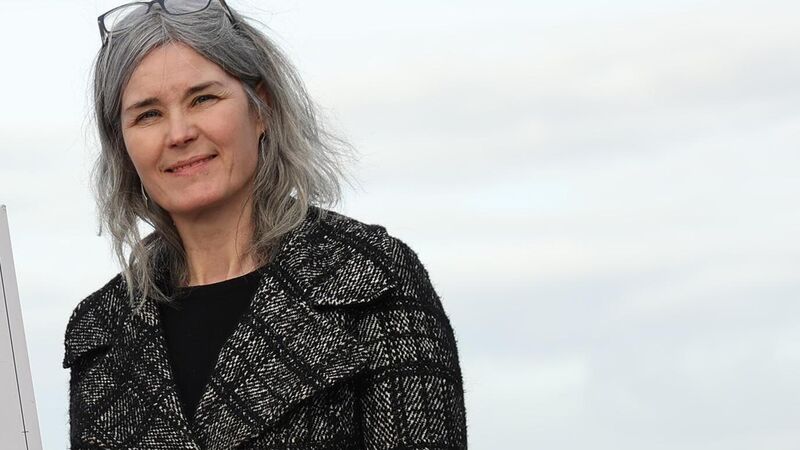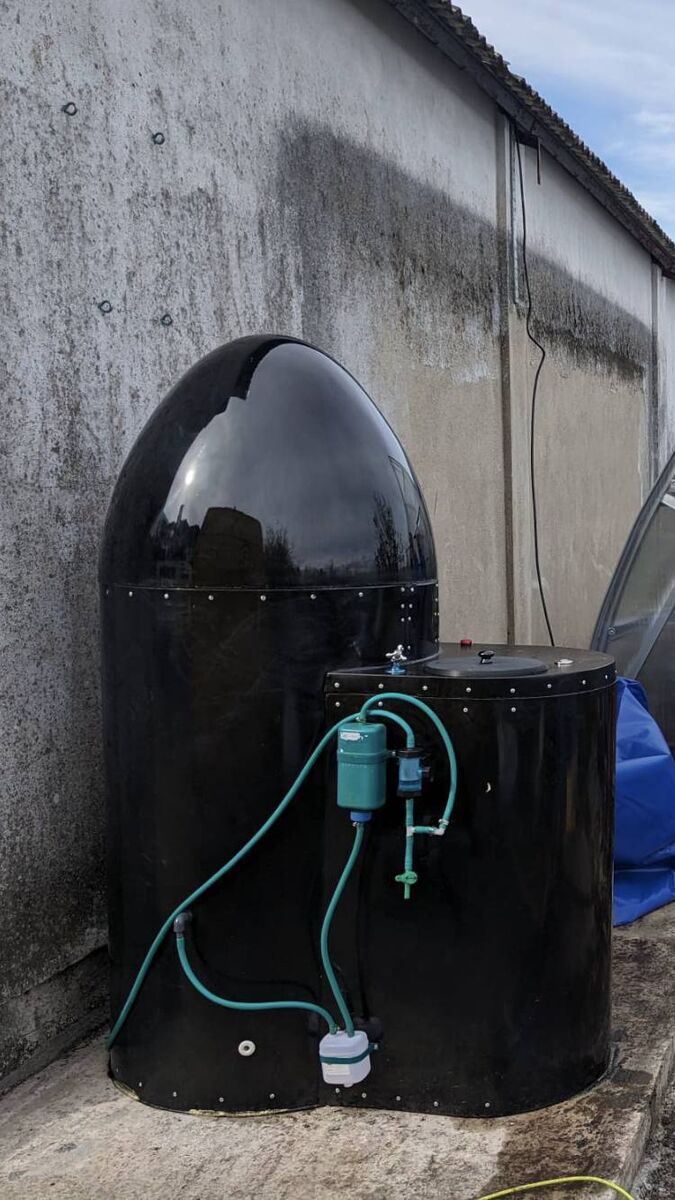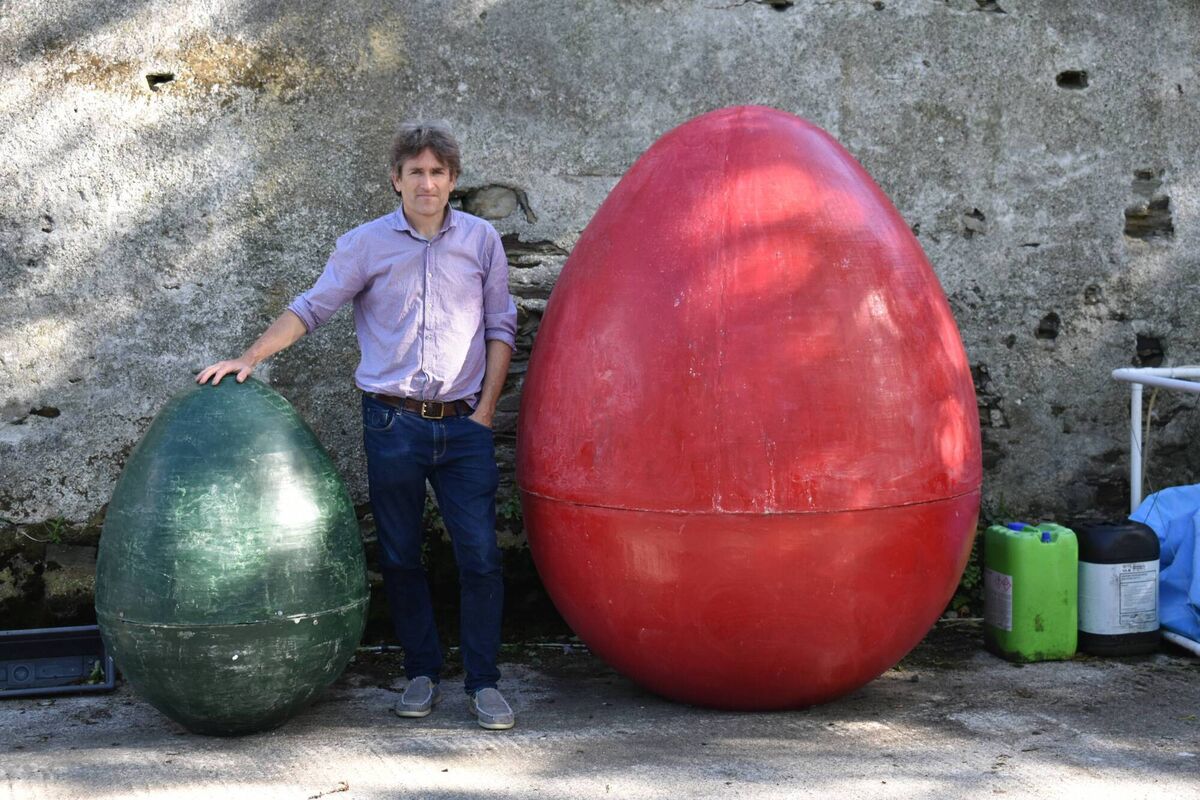‘You’re taking waste out of the system...and using it’: Cork community benefits from food waste solution

Fiona Kelleher of MyGug-a micro-scale anaerobic digester that turns food waste into a green renewable energy source, suitable for homes, schools and small food businesses. Fiona Kelleher, co-founder and COO, MyGug.
In the second installment of her series focusing on sustainable food, KATE RYAN meets Fiona Kelleher of MyGug and hears how islanders in Cape Clear are benefiting from their food waste solution.
What if I told you the future of climate action was egg-shaped?
MyGug is a food waste solution I first noticed in 2020 when its inventor, Kieran Coffey, had just a couple of prototypes out in the wild, and I was immediately fascinated by this new technology which had the potential to revolutionise the problem of food waste.
What is MyGug and how does it work?
MyGug is an anaerobic digester (AD), the process by which bacteria that can survive without air decomposes organic material, scaled down for use by householders and small- to medium-sized businesses.
It’s different to other composting systems because it can take any kind of food waste: milk, yogurt, plate waste, alcohol, meat and fish, sauces, oils, grease.
As waste breaks down, it releases a gas that’s captured and reused for cooking, and a liquid digestate (fertiliser) for use in growing more food and making your garden bloom.
It’s egg-shaped because for AD to work efficiently, there must be good mixing. An egg has no corners, no area that will allow solids to settle or ‘Dead Zones’.
Five years after I first wrote about MyGug, I caught up with Fiona Kelleher, CEO, and half of the wonder egg’s husband and wife team, to find out how the technology has moved on, how it’s working in real life situations, and exciting developments for the year ahead.

Fiona came on board as CEO in 2021 to focus on securing funding to support research and development, prototyping, and getting more units out and working in real-world situations.
“We are an Enterprise Ireland High Potential Start Up, which came with a tranche of funding and supports around mentoring and business development, and we have a co-investor, BVP Business Venture Partners, based in Dublin.
With that fundraising, we’ve been able to build a path of development since the end of 2023, and that has helped us build capacity in terms of looking at the market and seeing where we need to go.
“We’ve been able to bring on new employees, and we’re looking now at expanding our team further. Having the team is critical because when it was just me and Kieran working, that was all very well, but you’re covering a lot of bases. Now we need a more strategic focus.”
The funding has also helped with redesigning the original MyGug Prototype into four new digestors in different sizes: Micro, Mini, Midi and Maxi.
The smallest, the Micro, is designed for household use and takes up no more room than a standard wheelie bin.
But it has been the MyGug systems installed into education settings that have proved to be a great source of insight, driving a collaborative design feedback loop.
“We’ve had lots of interest from education and universities. Sustainability education is so important, and we fit right into that model because we provide a hands-on tool for sustainability education.”
Food, food waste, sustainability and climate action are all issues that need solutions coming from more than one perspective, enhancing cross-learning opportunities within schools and colleges.
“MTU has a unit in the culinary school for its food waste management, but they’re also using it for sustainable engineering, physical sciences, horticulture and engineering courses, so there’s lots of potential.” There’s also evidence that MyGug in educational settings is actively helping to alleviate feelings of climate anxiety in young people.
“Our younger people in second and third level education are feeling climate anxiety quite strongly. In education, there are new courses in sustainability, design sustainability and production, and all those feed into MyGug because it’s seen as a complete solution from the food waste perspective.
“This kind of innovation makes the future look that bit brighter for the students and relieves some of their climate anxiety through taking action.
“We feel MyGug is a technology to interact with. It allows students to take climate action. That’s what’s attractive to schools and third level education.”
Likewise for householders, says Fiona, wanting to take climate action but stalling from overwhelm.
“Householders are asking what they can do. They can be totally dependent on bin collection services or outside sources for energy creation and looking for ways they can take back a little bit of power.”
Behavioural change means thinking about food waste differently; not as a problem, but a resource to be captured. But, the first change must be around food waste reduction, says Fiona.
“It’s unlikely to see a point where we are not producing waste of some kind, but there must be a collaborative attitude where waste reduction is achieved.
“Our system fits so well into the idea of reduction and recycling because we are saying to go as low as you can. You’ll still have food waste but use your MyGug for that and turn it into energy.“
Achieving this kind of behavioural change on a scale where it empowers communities and small-scale users to do the right thing and taking waste away from a dependence on outside sources is, says Fiona, a huge USP for MyGug.
We hear the stories of sewer networks and wastewater treatment plants getting clogged up with ‘fatbergs’ from a build-up of fatty, oily and viscous liquids thrown down kitchen sinks because there’s nowhere else for it to go – especially on a domestic level.
“That stuff is rocket fuel for MyGug,” says Fiona.

Food waste is a key problem for island communities. Cape Clear is the most south-westerly island located off the coast of Baltimore in West Cork. Islanders are self-sufficient and resilient by necessity of geography, but one problem that had become increasingly difficult to manage was that of food waste.
Cape Clear does not have a waste collection service. Most waste is transported by boat to Baltimore where it is dealt with. But this is not feasible with food waste, and composting is not an option, especially with regards to cooked or plate waste, meat and fish and can lead to problems with vermin.
“Tograí Chléire is a community group on the island headed up by a group of four women, and they work on all elements of sustainability and community on the island.
“They got in touch with us because they were having a real difficulty on the island, and without a collection service were left with limited options,” explains Fiona.
“They were looking for something specific and applied for the Community Climate Action Plan Fund for a MyGug from Cork County Council and were successful.”
Fiona recalls seeing the MyGug head over the horizon during quite dramatic and stormy seas, but it arrived safely, and change began immediately.
“Everybody got a little caddy on the island for their food waste, and once a week the islanders bring down all their food waste to their MyGug. A group of volunteers feed the MyGug every week, the gas bag fills, they batch cook with the gas, make community meals, hand out digestate and everyone is growing.
“They’ve created their own circular economy, and they love it! It’s eradicated their food waste problem.
“They’ve cut off where the problem lies at source, so in terms of their sustainability plan and their overall carbon reduction, this is going to be significant as time goes on.”
The recent scaling up of MyGug has also seen costs coming down, says Fiona, with the household model, Micro, coming in at under €3,000.
“Compared to solar for a house, which is €8,000+ even with the grant, this is a no-brainer as far as we’re concerned.
“When you do have a power cut, MyGug is still going to work for you, you’ll have some cooking gas and grow your own food. It’s a really good deal for households.”
Those early adopters agree, with all saying MyGug is where they can see, in real time, the impact.
In some situations, MyGug can easily outperform solar because its efficiency isn’t dependent on position, location, temperature or weather.
“MyGug works all year round; it’s totally dependable, which is important in terms of that ROI.”
This is shaping up to be a bright year for the MyGug team, with partnerships in GIY in Waterford and Airfield Estate in Dundrum, both of which are educational farms with onsite cafés, and practising a zero-waste approach to food.
“We really want to collaborate around the growing side, where we see the potential of sharing the knowledge, particularly where the liquid plant food is concerned.
“Airfield Estate do a lot of work with education and schools, and we’ll be collaborating with them to develop a programme of education where MyGug would feature.”
The year ahead will also see a national roll-out of MyGug Micro for households across Ireland.
“We already have an active waiting list for that, which we’re very excited about,” says Fiona.
“We hope to do more work in education, too. I love seeing MyGug going into those settings where you can see the potential of introducing a technology young people can run with and learn from. They are the innovators of the future.
“We’ve taken it this far and we will take it further, but once you put it into the hands of those young people, we’ll see even more innovation.”
In short, 2025 is going to be a big year for MyGug, or maybe I should say, small but mighty.







 App?
App?


